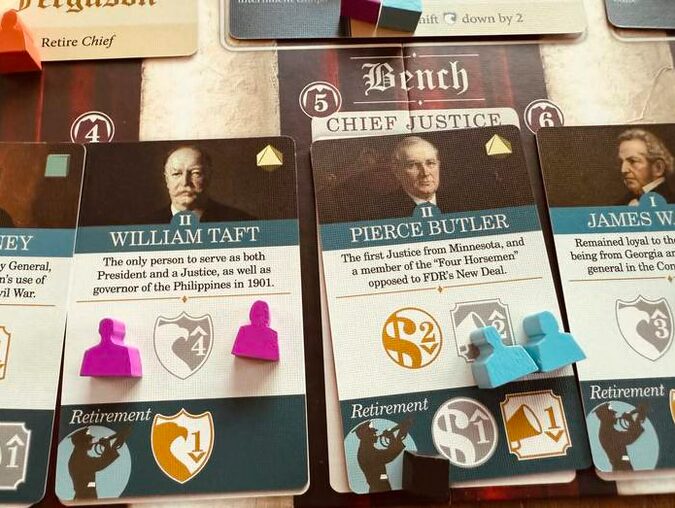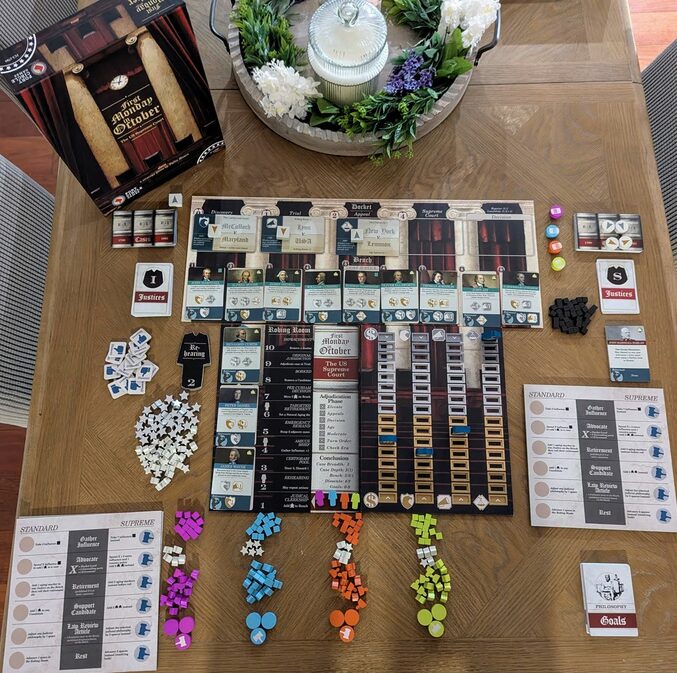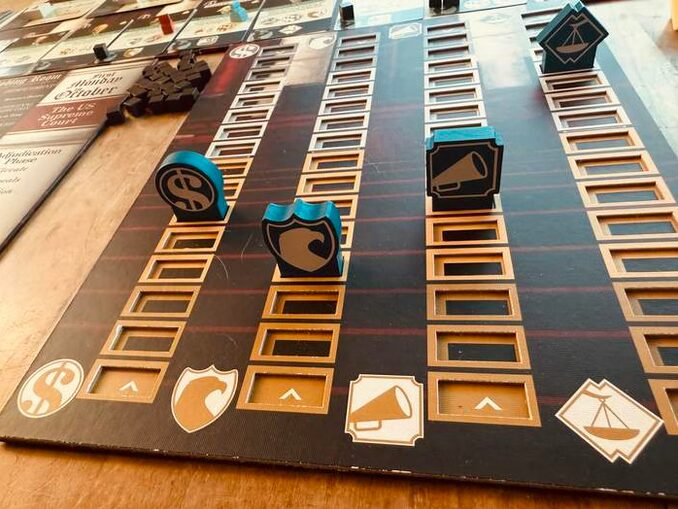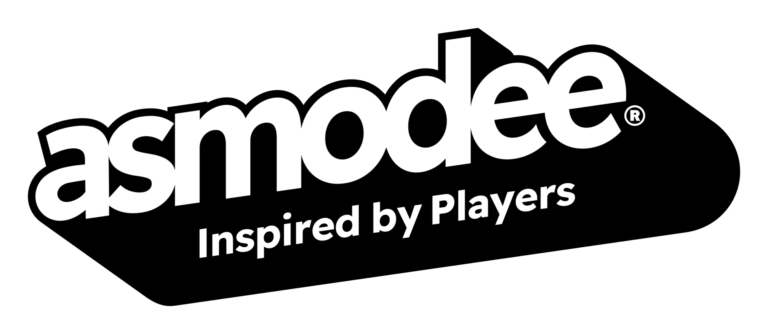
Facebook bans Votes for Women publisher’s ads again – this time for its board game about the history of the US Supreme Court
Facebook has banned ads for a Kickstarter from small historical board game publisher Fort Circle Games for the second time this year – this time claiming its game about the history of the US Supreme Court is a “sensitive social issue”.
Fort Circle previously faced a shortfall of up to $60,000 for its Kickstarter for Votes for Women, its critically acclaimed card-driven wargame about the fight for women’s suffrage in the US, when Facebook repeatedly pulled ads for its campaign in January.
Facebook eventually admitted those ads had been “removed in error” and restored the campaign, although Fort Circle founder Kevin Bertman said at the time the unbanning after several weeks of fighting came too late to benefit the Kickstarter campaign.
Despite apologising for its error, Facebook is now rejecting ads for Fort Circle’s current Kickstarter campaign for First Monday in October, which sees players recreating the history of the US Supreme Court between 1789 and 2010.
Bertram told BoardGameWire the publisher is facing an identical situation to its Votes for Women campaign, with ads making it through an initial screening and running for a day or two before being removed by Facebook.
He added that he requested a review of the situation when he was notified of the issue on Thanksgiving, but said that review had since been denied.

Facebook’s erroneous removal of ads for Votes for Women were flagged because they either mentioned a politician or were about “sensitive social issues”, which “could influence how people vote and may impact the outcome of an election or pending legislation”.
BoardGameWire has approached Facebook owner Meta to clarify its decision to remove the ads, but is yet to receive a response.
First Monday in October, designed by Talia Rosen and developed by Twilight Struggle co-designer Jason Matthews, tasks players with competing to score points by advocating for the winning side of cases decided by the Supreme Court, and by shaping the judicial philosophy of the Court to align with their hidden objectives.
The most recent case detailed in the game, Printz vs USA, dealt with whether demanding state and local law enforcement officers to conduct background checks on prospective handgun purchasers violated the US Constitution. That case was decided more than 27 years ago, in 1997.
Bertram said, “Facebook’s ad bans do not pose an existential risk to the company – but they do pose an existential risk to our ability to publish games that intersect with the history of the United States and its political system.
“When Facebook banned our ads during the Votes for Women Kickstarter campaign, we were thrilled how the community rallied to the campaign – but now we have Votes for Women in stock and we still cannot run Facebook ads for the game.”
“For this to happen again would be amusing if it wasn’t so harmful to our company’s prospects. For this campaign we allocated $25,000 for Facebook ads and the very early numbers – before the ads were taken down by Facebook – suggested we would raise $100,000 from those ads.
“We expect First Monday in October to be a big hit for us and for us to not be able to reach potential customers via Facebook ads is really frustrating for the whole team.”
“If I was more conspiracy-minded, I would suggest that Facebook is deliberately blocking games that are educational in regards to the US Constitution, the Amendment process and the Supreme Court of the United States.
“But regardless of why this is happening, it would not be happening if we made cute games about kittens or butterflies or unicorns.
“If Mark Zuckerberg wanted to turn this into a win-win, he would have his charity write us a check to send a copy of Votes for Women, First Monday in October and Founding Fathers to every middle school and high school in the United States.”
Betram added that he was hesitant to try more ads on the platform, which he also uses to stay in touch with friends and family around the world, after receiving a warning that his account could be disabled or restricted if Facebook decided the ads go against its advertising standards policy.

First Monday in October developer Jason Matthews told BoardGameWire, “I mean it’s just incredible. But it is the perfect illustration of a soulless, lifeless corporation making decisions by algorithm.
“…as for my reaction, what can you say about stupid? Is Mark Zuckerberg really so broke that Meta can’t afford to put a human in its decision loops? Is censorship by AI the kind of future we can all look forward to?
“Fort Circle is just a little independent game company trying to expose Americans to their history through games. It is literally mom and apple pie. To have Meta reject that on Thanksgiving morning pretty much tells you all you need to know.
“When Meta did something similar to Votes for Women at least I could understand who a dumb algorithm could see the title and flag it about elections. But a game about the 200-year legal history of the Supreme Court? Does Meta ban historical books? Is Gladiator II triggering ad reviews? It’s total nonsense. I really didn’t think this would happen again.
“In terms of the discoverability of games, it honestly puts our games at a huge marketing disadvantage. And the timing couldn’t be worse.
“It’s obvious that our country needs more exposure to its history, not less. And here’s the most powerful social media company in the world throwing up mindless hurdles and barriers.
“Meta had an oversized impact on our democracy by serving as a platform for Russian bots and information operations. Their reaction to their failures in 2015 seems to be even worse – automated discrimination. Is the employment of a few thinking human beings too much to ask for a company with $48bn in profits last years?”
First Monday in October had pulled in about $70,000 from more than 750 backers as of December 5, with 15 days of the Kickstarter campaign remaining.
The game’s designer, Talia Rosen, has worked as an attorney for the Public Broadcasting Service for more than 15 years.
She told BoardGameWire the design process for the game had been “a long and winding road”, with her initial ideas starting to come together in 2011 and 2012, before she dived into the bulk of the design work about six years ago.
Rosen said she was “surprised” and “disappointed” at the Facebook ad ban for her game, saying, “First Monday in October is an entirely historical game centered around actual Justices and cases from past decades and centuries.
“…I hope that everyone nonetheless has a chance to hear about this educational game one way or another.
“I was thrilled to see the game soar past its initial crowdfunding goal, and I’m hopeful that the game will find an audience with people across the country and across the world.”
The First Monday in October Kickstarter runs until December 21.







[…] Rosen about the history of the United States Supreme Court — have been rejected by Facebook, according to an article by BoardGameWire. Fort Circle had allocated roughly $25,000 on Meta advertising, estimating that amount would […]
[…] on two topics of particular interest to me, board games and the enshittification of social media: Facebook banned ads for the Kickstarter for an upcoming board game called First Monday in October, which is about the Supreme Court, claiming the ads’ content could somehow influence how people […]